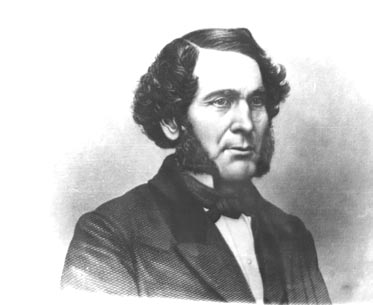


|
His father was a farmer, and his early educational advantages were those of the sons of our ordinary New England farmers. At the age of seventeen he was apprenticed to the cabinet making-business, and at the close of his minority he took the business of his former master into his hands. He soon connected with this business the lumber trade. It will illustrate his enterprise thus early in his business life, that while engaged in this trade he imported the first cargo of hard coal ever brought to Stamford.
In 1831, the canal extending from the harbor up into the center of the village was opened. Mr. Hoyt united his business with the drygoods and grocery trade of his two brothers, William and Roswell. Leasing the canal for five years, they purchased shipping and did their own carrying trade, and imported their own West India goods. In this business he continued with varied success until the expiration of their lease, when he resumed the lumber trade, in which he continued until the New York and New Haven Railroad was projected. In the building of this great thoroughfare he entered into contracts for grading portions of it, building bridges, and furnishing ties. All of these contracts were promptly and acceptably executed. On the completion of the road, at first built with a single track, he contracted to supply it with fuel, and when the second track was laid, he was a heavy contractor for the work. From this statement it will be seen that Mr. Hoyt, from the very beginning of this great public work until it had fairly established itself as an efficiently-managed enterprise, had been connected with it in such ways as to make him familiar with its character and wants. He had enjoyed a good opportunity of watching the management of the road under its chief engineer and first superintendent, Mr. R. B. Mason, subsequently connected with the Illinois Central Railway; and also under its second superintendent, Geo. W. Whistler, jr. That he had not neglected the opportunity thus furnished him is evidenced in the unanimity of the choice which called him to the superintendency of the road on the resignation of Mr. Whistler in 1854. Still better evidence has been furnished in the increasing success which has attended his administration during the fifteen years he has held this onerous and responsible post.
His entrance upon the office was signalized a by sudden blow, which, under a less efficient administration, would have doomed the road to a partial or total suspension. But, despite the extensive Schuyler frauds, and the preceding catastrophe at the Norwalk bridge, the stock of the road has steadily risen from about 90, its market price when Mr. Hoyt entered upon its superintendency, to over 150. Nor is it more than the truth will warrant, to affirm, that no one who has been connected with the road from its opening to the present time, is its advance more certainly due to Mr. Hoyt. His unwearied care and painstaking devotion to the interests of the road from the time of his first contract; his minute attention to the least defect, either in the road-bed, or bridges, or rolling-stock, or in the habits or manners of the employees on the road, with his prompt remedy for it, or as faithful and prompt a reference of it, if not within reach of his authority, to the board of directors have made him first among our eminent railway superintendents; and he has not been without abundant testimonials, both from his own board of directors, and from the employees of the road, to the esteem and affection in which he is held.
In his private life Mr. Hoyt is eminently a domestic man. His home, when not in his business, is emphatically in the bosom of his family. He married January 31, 1838, Sarah J. Grey, of Darien, and they have five children, three of whom are now living. It was a very severe stroke which bereaved him of his wife. He had entrusted to her the entire administration of his domestic matters, because his official duties required all his strength. He only asked, what in the stress of his care and responsibility he so much needed, a quiet and restful home, in which he could find the repose that should refit him for his work. And it was just such a home that he found, under her administration, always ready to welcome him.
In politics Mr. Hoyt has always been with the democratic party. Though not an aspirant for office, he has represented his native town and his senatorial district in the state legislature. He was a principal mover in the organization of the Stamford Savings Bank, of which he has been for several years the president.
As a practical business man, Mr. Hoyt stands among the first of his townsmen. He has reaped the rewards of his earnest and honorable enterprise, both in a most excellent business reputation, and in the still more tangible token of a handsome worldly estate.
Photo Selection of the Month, December 2000